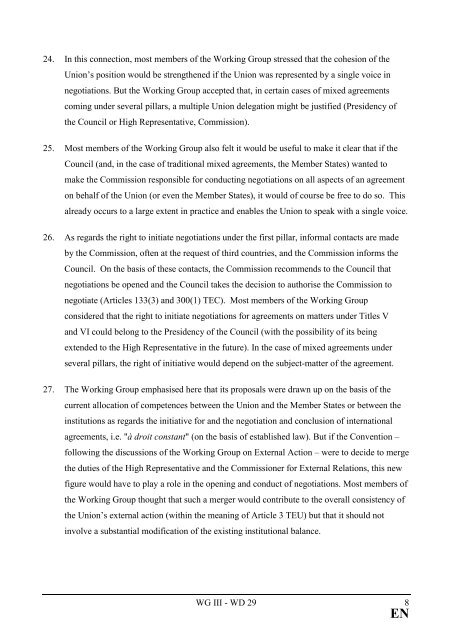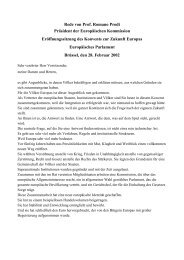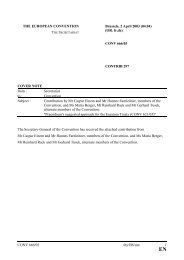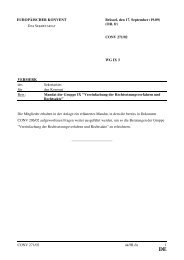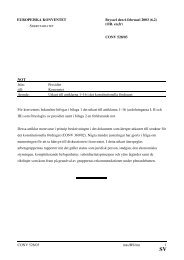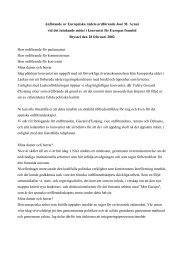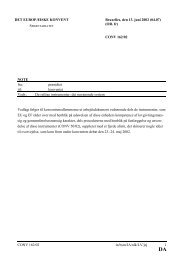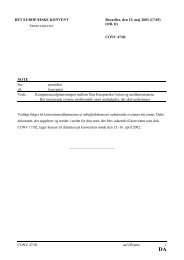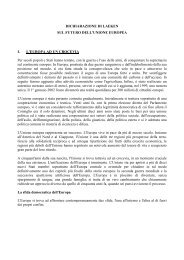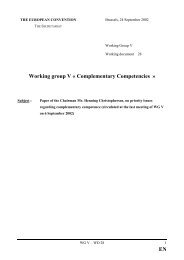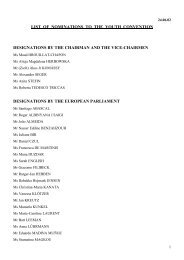WG III - WD 29 1 THE EUROPEAN CONVENTION Brussels, 24 ...
WG III - WD 29 1 THE EUROPEAN CONVENTION Brussels, 24 ...
WG III - WD 29 1 THE EUROPEAN CONVENTION Brussels, 24 ...
Create successful ePaper yourself
Turn your PDF publications into a flip-book with our unique Google optimized e-Paper software.
<strong>24</strong>. In this connection, most members of the Working Group stressed that the cohesion of the<br />
Union’s position would be strengthened if the Union was represented by a single voice in<br />
negotiations. But the Working Group accepted that, in certain cases of mixed agreements<br />
coming under several pillars, a multiple Union delegation might be justified (Presidency of<br />
the Council or High Representative, Commission).<br />
25. Most members of the Working Group also felt it would be useful to make it clear that if the<br />
Council (and, in the case of traditional mixed agreements, the Member States) wanted to<br />
make the Commission responsible for conducting negotiations on all aspects of an agreement<br />
on behalf of the Union (or even the Member States), it would of course be free to do so. This<br />
already occurs to a large extent in practice and enables the Union to speak with a single voice.<br />
26. As regards the right to initiate negotiations under the first pillar, informal contacts are made<br />
by the Commission, often at the request of third countries, and the Commission informs the<br />
Council. On the basis of these contacts, the Commission recommends to the Council that<br />
negotiations be opened and the Council takes the decision to authorise the Commission to<br />
negotiate (Articles 133(3) and 300(1) TEC). Most members of the Working Group<br />
considered that the right to initiate negotiations for agreements on matters under Titles V<br />
and VI could belong to the Presidency of the Council (with the possibility of its being<br />
extended to the High Representative in the future). In the case of mixed agreements under<br />
several pillars, the right of initiative would depend on the subject-matter of the agreement.<br />
27. The Working Group emphasised here that its proposals were drawn up on the basis of the<br />
current allocation of competences between the Union and the Member States or between the<br />
institutions as regards the initiative for and the negotiation and conclusion of international<br />
agreements, i.e. "à droit constant" (on the basis of established law). But if the Convention –<br />
following the discussions of the Working Group on External Action – were to decide to merge<br />
the duties of the High Representative and the Commissioner for External Relations, this new<br />
figure would have to play a role in the opening and conduct of negotiations. Most members of<br />
the Working Group thought that such a merger would contribute to the overall consistency of<br />
the Union’s external action (within the meaning of Article 3 TEU) but that it should not<br />
involve a substantial modification of the existing institutional balance.<br />
<strong>WG</strong> <strong>III</strong> - <strong>WD</strong> <strong>29</strong> 8<br />
EN


